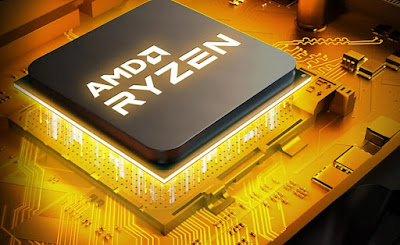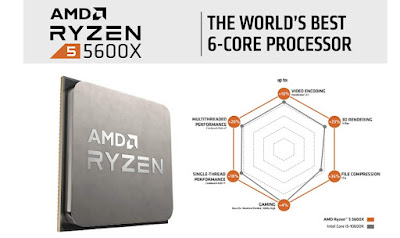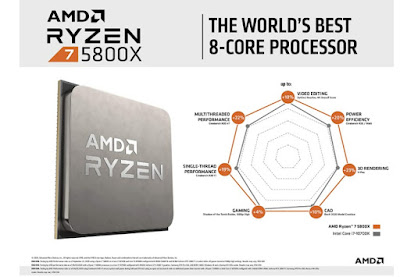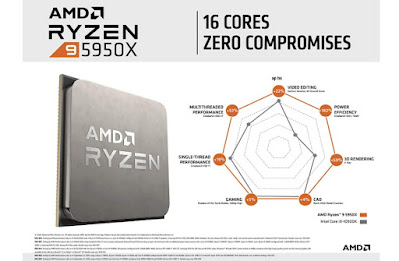 On computer websites, when computers to buy are recommended, the most important choice is the one related to the processor, on which the motherboard (which must support the chosen CPU) and the other pieces to follow depends.
On computer websites, when computers to buy are recommended, the most important choice is the one related to the processor, on which the motherboard (which must support the chosen CPU) and the other pieces to follow depends.When choosing a PC processor the choice falls between two major manufacturers: Intel and AMD. For at least a decade, the rule has been that if you have money to spend, you have to choose an Intel processor, while AMD has always been the budget brand. Lately, however, things are changing thanks to the launch with the various evolutions of the AMD Ryzen processors, which have achieved some commercial success to be a real alternative to Intel Core CPUs, spending an adequate amount and obtaining well-balanced processors from all. the points of view.
In the following guide we will show you why an AMD Ryzen processor is worth buying for our new PC, avoiding chasing Intel at all costs for home computers or the computers we build ourselves, giving AMD at least a chance.
READ ALSO: Differences between Intel and AMD processors and Intel Core i7 and i5 CPUs
Preliminary information
The big problem in choosing the CPU / motherboard combination it’s all about socket, which is the slot with which the processor attaches to the motherboard. Ryzen processors support the AM4 socket, flanked by a whole series of dedicated chipsets: buying a new processor, therefore, also means changing the motherboard and, probably, also the RAM.
This continuous modification of the sockets, justified to allow performance improvements and which is also a market strategy, can prevent the programming of future hardware updates for the PC if we do not know well what version of socket we already have or on which we decide to bet.
Do AMD sockets last longer?
Talking about socket for AMD processors it should be noted that their compatibility is much more durable than Intel processors. For example, the AM3 + socket introduced in 2011 remained compatible until 2017, while the current socket (AM4) provides support for all generations of Ryzen currently on the market (Zen 1, Zen +, Zen 2 and the latest Zen 3) and has been around for 4 years.
This means if you want to change processor over time AMD may be the right choice, especially if you choose a socket and a chipset just placed on the market: on paper it will be possible to change the CPU even every 2-3 years, maintaining support even with the new processors (within certain limits and keeping the BIOS / UEFI updated motherboard).
By comparison, Intel sockets are hardly supported for more than 3 years, making it necessary to change the motherboard more often in the event of a processor upgrade.
AMD Ryzen models and versions
Keeping in mind the advantages of AMD sockets, we can finally go and find out what are Ryzen processors and what they offer in terms of functionality.
The names of the AMD processors mirror those of Intel: we find in fact the Ryzen 3, Ryzen 5, Ryzen 7 e Ryzen 9, which makes it much easier to understand which processor is good for laptops and cheap PCs (Ryzen 3) and which processor to aim for for those who want maximum power for gaming or for heavier programs (Ryzen 9). The right compromise can be found on the Ryzen 5 and Ryzen 7, both for sale at a good price and with the power to do anything on your computer.
Next to the name of the AMD processor we also find the version number: currently the new processors of the AMD family are presented with the version numbers 5000 (example AMD Ryzen 5600x), which identify models with latest generation Zen 3 architecture. We currently recommend avoiding the AMD Ryzen 4000 or 3000, as they are already outdated compared to the 5000 series models.
Buying Guide
If we want an excellent processor for all home needs we can take a look at the Ryzen 5 5600X (300 €).

If, on the other hand, we are looking for a powerful processor to play, to use CAD and to use other heavy programs, we can focus on the AMD Ryzen 7 5800X (450 €).

If, on the other hand, we want a high-powered processor for extreme gaming PCs or to set up mini data processing servers, it may be a good idea to focus on the AMD Ryzen 9 5950X (750 €).

Conclusions
Is it worth buying an AMD processor for home computers? The answer is absolutely Yes: all modern processors tend to be even superior to Intel of the same category, thus proving to be an excellent compromise between quality and selling price. High-end processors cost practically like Intel, but we can still set up a good PC with the recommended Ryzen 5, which should always be accompanied by a good motherboard, fast DDR4 RAM banks and an M.2 SSD disk to use it as must.
If we can’t set up a powerful PC right away, we can always choose the components for a good mid-range PC, so as to have a computer suitable for ZOOM calls, for videoconferencing and for studying.
